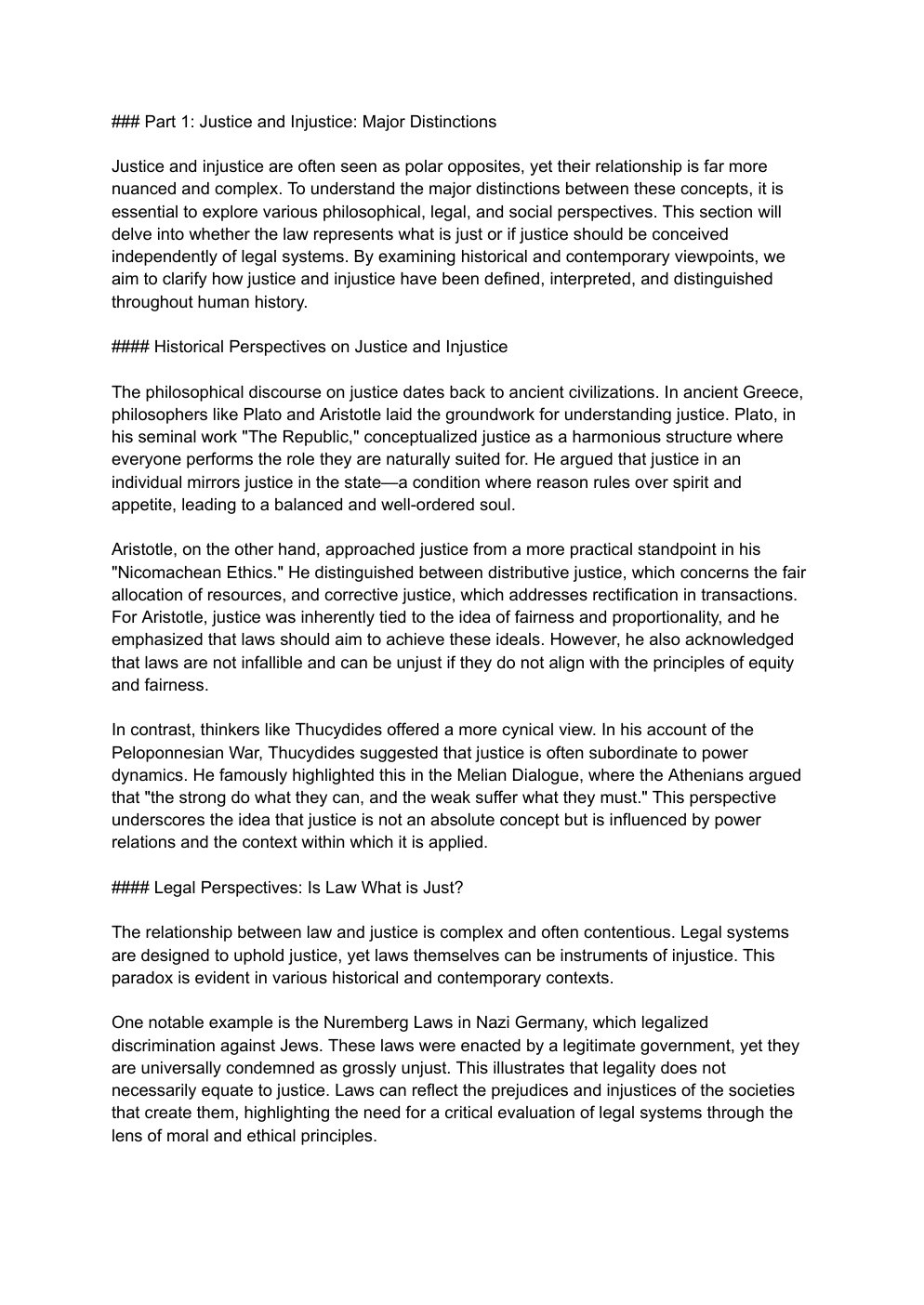Knowledge ### Part 1: Justice and Injustice: Major Distinctions
Publié le 12/06/2024
Extrait du document
«
### Part 1: Justice and Injustice: Major Distinctions
Justice and injustice are often seen as polar opposites, yet their relationship is far more
nuanced and complex.
To understand the major distinctions between these concepts, it is
essential to explore various philosophical, legal, and social perspectives.
This section will
delve into whether the law represents what is just or if justice should be conceived
independently of legal systems.
By examining historical and contemporary viewpoints, we
aim to clarify how justice and injustice have been defined, interpreted, and distinguished
throughout human history.
#### Historical Perspectives on Justice and Injustice
The philosophical discourse on justice dates back to ancient civilizations.
In ancient Greece,
philosophers like Plato and Aristotle laid the groundwork for understanding justice.
Plato, in
his seminal work "The Republic," conceptualized justice as a harmonious structure where
everyone performs the role they are naturally suited for.
He argued that justice in an
individual mirrors justice in the state—a condition where reason rules over spirit and
appetite, leading to a balanced and well-ordered soul.
Aristotle, on the other hand, approached justice from a more practical standpoint in his
"Nicomachean Ethics." He distinguished between distributive justice, which concerns the fair
allocation of resources, and corrective justice, which addresses rectification in transactions.
For Aristotle, justice was inherently tied to the idea of fairness and proportionality, and he
emphasized that laws should aim to achieve these ideals.
However, he also acknowledged
that laws are not infallible and can be unjust if they do not align with the principles of equity
and fairness.
In contrast, thinkers like Thucydides offered a more cynical view.
In his account of the
Peloponnesian War, Thucydides suggested that justice is often subordinate to power
dynamics.
He famously highlighted this in the Melian Dialogue, where the Athenians argued
that "the strong do what they can, and the weak suffer what they must." This perspective
underscores the idea that justice is not an absolute concept but is influenced by power
relations and the context within which it is applied.
#### Legal Perspectives: Is Law What is Just?
The relationship between law and justice is complex and often contentious.
Legal systems
are designed to uphold justice, yet laws themselves can be instruments of injustice.
This
paradox is evident in various historical and contemporary contexts.
One notable example is the Nuremberg Laws in Nazi Germany, which legalized
discrimination against Jews.
These laws were enacted by a legitimate government, yet they
are universally condemned as grossly unjust.
This illustrates that legality does not
necessarily equate to justice.
Laws can reflect the prejudices and injustices of the societies
that create them, highlighting the need for a critical evaluation of legal systems through the
lens of moral and ethical principles.
In modern democratic societies, the legal system aims to embody justice by ensuring
fairness, protecting rights, and providing mechanisms for redress.
However, even in these
systems, laws can perpetuate injustice.
For instance, systemic biases in criminal justice
systems can lead to disproportionate incarceration rates among marginalized communities.
These biases can be rooted in historical injustices and ongoing social inequalities, showing
that legal systems must continually evolve to address and rectify such injustices.
#### Philosophical Theories on Justice and Law
Several philosophical theories provide frameworks for understanding the relationship
between law and justice.
Natural law theory posits that there are inherent principles of justice
that transcend human-made laws.
According to this view, laws are just if they align with
these universal moral principles.
This perspective is rooted in the works of philosophers like
Thomas Aquinas, who argued that human laws derive their legitimacy from their conformity
to natural law.
Conversely, legal positivism, championed by thinkers like John Austin and H.L.A.
Hart,
asserts that law and morality are distinct.
According to this view, the....
»
↓↓↓ APERÇU DU DOCUMENT ↓↓↓
Liens utiles
- Chacun d'entre nous n'est-il pas, par sa manière de vivre, le premier responsable de la justice ou de l'injustice ?
- Y a-t-il une opposition absolue entre la justice et l'injustice ?
- commentaire philo Leibniz Monadologie et la justice
- Chapitre 5 : Quelles inégalités sont compatibles avec les déférentes conceptions de la justice sociale ?
- Ch7 : Quelles inégalités sont compatibles avec les différentes conceptions de la justice sociale ?

































